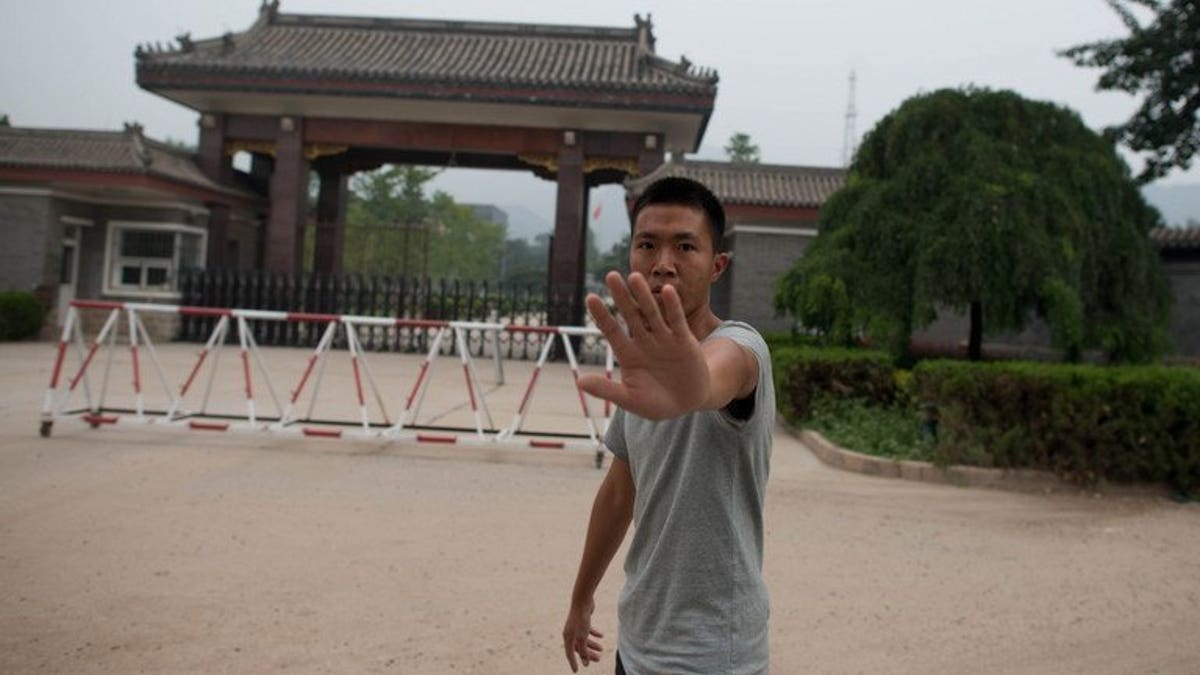
A Chinese policeman attempts to stop photos from being taken at the entrance to Qincheng prison near Beijing, on September 12, 2013. Fallen high-flyer Bo Xilai can expect hotel-style treatment at the jail for China's political elite, where he will enjoy comfortable surroundings but be constantly monitored by government agents, former prisoners have told AFP. (AFP/File)
QINCHENG, China (AFP) – Fallen high-flyer Bo Xilai can expect hotel-style treatment at a jail for China's political elite, where he will enjoy comfortable surroundings but be constantly monitored by government agents, former prisoners say.
Hidden in wooded hills north of Beijing, guards stand outside the red gate of Qincheng prison, where the once-powerful Bo is widely expected to begin his life sentence after being convicted Sunday of bribery, embezzlement and abuse of power.
The jail has high grey walls, but there are no obvious signs of barbed wire or watchtowers.
"It's like a five-star hotel," said Bao Tong, a former secretary to the ruling Communist Party's all-powerful Politburo Standing Committee who spent seven years in the prison for opposing the 1989 crackdown on protesters in Beijing's Tiananmen Square.
Inmates at the facility -- which has housed almost all the high-ranking politicians jailed in China since the 1960s -- are given large private cells equipped with soft beds, sofas, desks and an en-suite bathroom, former residents said.
"I was pleasantly surprised the first time I saw my room," Dai Qing, the adopted daughter of a Chinese commander, wrote in a description to AFP.
Dai, who spent 10 months in the prison for supporting the Tiananmen demonstrators, described her cell as about 20 square metres large (215 square feet) and coming "with high ceilings... and even a bathroom", while prison guards treated her with "warmth and care".
"The head of the prison let me put on better clothes before I left," she recalled of one occasion when she was let out to visit a sick relative. "He reminded me of my old school headmaster."
Prisoners can choose their clothes, drink milk for breakfast and eat selections of soups and meat dishes for lunch and dinner, they said.
Some of the jail chefs used to work in one of Beijing's top hotels and prepare food to "ministry chief level", according to a recent report by the Beijing Times.
Information about the prison -- which does not appear on any Chinese maps -- is tightly controlled in China, but a trickle of reports have emerged.
The former Communist Party boss in Shanghai, Chen Liangyu, jailed for graft in 2008, wore a western-style suit and practiced tai chi while incarcerated, Hong Kong media said.
Qincheng was expanded in the last year, with an old wall removed to make room for "pavilions, trees and grass reminiscent of a Chinese garden", the respected financial magazine Caijing reported last month.
The descriptions present a stark contrast with ordinary Chinese jails, where inmates generally share cramped cells, eat basic food and are encouraged to work, sometimes manufacturing goods for export.
"Qincheng gives the best treatment of any prison in China," said Chen Zeming, an academic blamed by authorities for helping to organise the Tiananmen protests and who spent several months in the facility.
The "Gang of Four", a political faction including former leader Mao Zedong's wife Jiang Qing, were sent to the prison following a high-profile trial in 1981. Prison authorities treated senior Party figures better than the Tiananmen activists, Chen said.
"Some prisoners were allowed outside to plant vegetables, later I realised one of them was Yao Wenyuan," he said, referring to one of the Gang of Four.
Built in the late 1950s with help from the Soviet Union, Qincheng is the only prison in China to be directly administered by state security, rather than judicial authorities.
"The prison is directly controlled by the Communist Party's central committee," Bao said. "The everyday situation of prisoners is reported directly to them."
Security officials stood outside his room at all hours noting his every change of position, Bao said, while Dai wrote of being constantly monitored.
Bo's status as the son of one of China's most famous revolutionary generals -- and his continued support among the party elite -- would ensure his comfort, the former inmates said.
"Bo Xilai won't be mistreated... he will have long periods to breathe the outside air and to communicate with others," said the academic Chen.
Bao added: "If Bo Xilai wants anything, and the central party agrees, then he will get it. If he wants to dance all day, and the party agrees, he can dance all day."
Top officials detained at Qincheng are often released on medical parole years before the end of their terms, according to reports never officially confirmed, and live out their days under house arrest.
"After two years, they will say (Bo) is ill and he will be released, and will live next to a lake," Bao predicted, "or by the sea".
